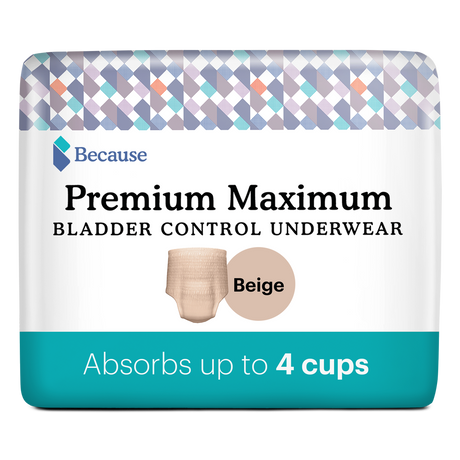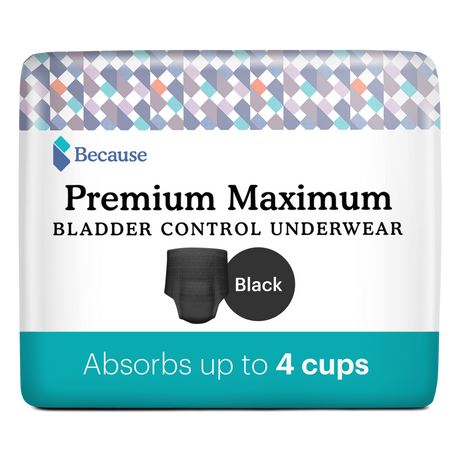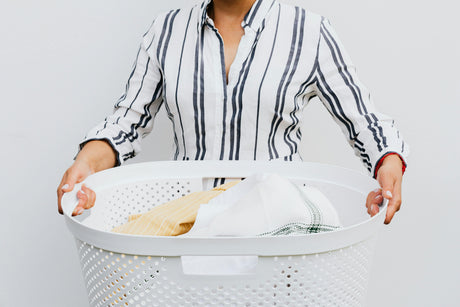Have you ever found yourself desperately needing to use the bathroom, only to realize you can't hold your pee? Or gone to the bathroom only to leak immediately after? It can be an embarrassing and uncomfortable situation, but rest assured, you're not alone. In this article, we will explore the common questions and concerns people have about their bladders and why they may be experiencing issues like inability to hold urine, leaking after going to the bathroom, or leaking when laughing.
Why can’t I hold my pee?
There are several factors that may contribute to an inability to hold urine. One common cause is weakened pelvic floor muscles. These muscles, located between the pubic bone and tailbone, support the bladder and help control urination. Factors such as childbirth, aging, obesity, or certain medical conditions can weaken these muscles and lead to bladder control issues.
 Pregnancy and Childbirth:
Pregnancy and Childbirth:
When it comes to weakened pelvic floor muscles, childbirth is a significant factor. In fact, 1 in 3 women who have had a baby experience urinary incontinence. The process of giving birth can put immense pressure on these muscles, causing them to stretch and potentially tear. This can result in a loss of muscle tone and strength, making it more difficult to hold urine. 30% of postpartum women experience leakage during the first 3 months after their delivery.
Overactive Bladder AKA Urge Incontinence:
Another potential cause of an inability to hold urine is an overactive bladder. This condition occurs when the bladder muscles contract involuntarily, causing a sudden and intense need to urinate. It can be accompanied by frequent urination, waking up at night to use the bathroom, and sometimes urine leakage.
Overactive bladder (also referred to as OAB) can be a result of various factors. For instance, certain medications can stimulate the bladder muscles, leading to increased urgency and a reduced ability to hold urine. Additionally, urinary tract infections can irritate the bladder, causing it to become hyperactive. Bladder stones, which are hard mineral deposits that form in the bladder, can also disrupt normal bladder function and contribute to an overactive bladder.

Weak Pelvic Floor Muscles
Your pelvic floor muscles are a hammock or sling-like set of muscles that span from the tailbone to the pubic bone within the pelvis. These muscles support the bowel and bladder, and in females they also support the uterus and vagina. These are the muscles that relax and contract to hold back urine, feces, and gas or to release them.
What do pelvic floor muscles have to do with bladder leaks?
The strength of your pelvic floor muscles are intimately connected with whether or not you experience bladder leaks. When your pelvic floor muscles aren’t functioning well, your internal organs lack full support—in this case, the bladder. by strengthening the pelvic floor and simply increasing your awareness of the pelvic floor, as well as learning how to engage pelvic floor muscles, you can begin to minimize and prevent bladder leakage.
Certain Medical Conditions:
Neurological conditions can also impact bladder control. Multiple sclerosis, for example, is a disease that affects the central nervous system and can disrupt the signals between the brain and the bladder. This can lead to bladder dysfunction, including an inability to hold urine.
It's important to note that psychological factors can also play a role in bladder control. Stress and anxiety can affect the body in various ways, including increasing muscle tension and potentially impacting bladder function. In some cases, individuals may experience a heightened sensitivity to the sensation of needing to urinate, leading to a decreased ability to hold urine.
In conclusion, an inability to hold urine can be caused by a variety of factors. Weakened pelvic floor muscles, an overactive bladder, medications, urinary tract infections, bladder stones, neurological conditions, and psychological factors can all contribute to bladder control issues. If you are experiencing difficulties with bladder control, it is important to consult with a healthcare professional for a proper diagnosis and appropriate treatment options.
Why do I leak urine after I go to the bathroom?
If you find that you experience urine leakage even after using the bathroom, it may be due to a condition called post-void dribbling. This occurs when your bladder doesn't fully empty, and residual urine remains in the urethra. As you stand up or move around, the pressure on the urethra can cause small amounts of urine to leak out. It can be frustrating, but there are measures you can take to manage this issue.
Engaging in pelvic floor exercises, also known as Kegel exercises, can help strengthen the muscles responsible for bladder control and reduce post-void dribbling. Additionally, making sure you take enough time to fully empty your bladder when using the bathroom and using gentle pressure techniques can also be effective.
Another cause could be Overflow incontinence. Overflow incontinence is a type of urinary incontinence characterized by the involuntary leakage of urine due to the bladder being unable to empty properly. It occurs when the bladder becomes overly full and exceeds its capacity, causing urine to overflow. You may have overflow incontinence if you find yourself unable to fully empty your bladder when you go to the bathroom and then later experience sudden release of urine.
There are a few other techniques that can help with urine leakage after urination. For example:

Why do I leak when I laugh?
If you experience urine leakage specifically when you laugh, cough, sneeze, or engage in physical activities, you may have stress urinary incontinence. This type of incontinence is known as stress incontinence (or sometimes cough incontinence) and it occurs when the pelvic floor muscles are weakened and cannot properly support the bladder during moments of pressure or stress.
Fortunately, there are solutions for managing stress urinary incontinence. One effective approach is using absorbent pads or protective garments to prevent any embarrassing leaks. Additionally, pelvic floor exercises and lifestyle changes such as maintaining a healthy weight and avoiding bladder irritants like caffeine and alcohol can significantly improve symptoms.
Causes of stress incontinence include:
- Age
- Hormonal changes, specifically around menopause
- Pregnancy and childbirth
- Chronic cough
- Weight
- Other medical conditions such as UTIs, diabetes, nerve damage, enlarged prostate, & prostate surgery
If you have symptoms of stress incontinence, and overactive bladder which was mentioned above, you may have what is referred to as mixed incontinence. To learn more about all 6 types of urinary incontinence, check out this blog.
Is it common to have bladder leaks?
Bladder leaks, whether it's the inability to hold urine or urinary incontinence, are more common than you might think. In fact, millions of people around the world experience bladder control issues at some point in their lives. While it can vary in severity and impact on daily life, it's important to remember that you are not alone in dealing with these challenges.
An estimated 423 million people worldwide experience some form of urinary incontinence with 25 million of those patients being American adults. Up to 75% of women over 65 report urine leakage. However, despite its prevalence many are still embarrassed to speak about their condition, resulting in delayed treatment. On average, women wait 6.5 years before seeing a provider for their symptoms. Men wait an average of 4.2 years.
It's essential to reach out for support and explore appropriate treatment options. With the right management techniques, most individuals can significantly improve their bladder control and regain confidence in their daily activities.

Are bladder leaks permanent?
Whether bladder leaks are permanent or not depends on the underlying cause and individual circumstances. In some cases, with appropriate treatment and lifestyle modifications, bladder control issues can be effectively managed or even resolved completely. Understanding the root cause and working closely with a healthcare professional can help develop a personalized plan for addressing bladder leaks.
It's worth noting that there are various treatment options available, such as medications, physical therapy, and surgical interventions, that can provide relief and improve bladder control. Consulting with a urologist or a healthcare provider who specializes in bladder health can help determine the most suitable course of action for your specific situation.
Additionally, incontinence can sometimes be prevented by practicing pelvic floor exercises before you begin to experience bladder leaks, maintaining a balanced diet, getting regular exercise, quitting smoking, and reducing alcohol intake. Engaging in pelvic floor strengthening exercises is particularly impactful for women who are pregnant or planning on becoming pregnant.
What doctor should I see about my bladder leaks?
If you're experiencing bladder control issues, it's crucial to seek medical advice. While primary care physicians can provide initial guidance, you may benefit from a referral to a specialist who focuses on bladder health, such as a urologist or a urogynecologist.
These healthcare professionals have specialized knowledge and experience in diagnosing and treating bladder conditions. They can assess your symptoms, perform necessary tests, and suggest appropriate treatment options tailored to your needs.
Experiencing difficulties in holding your pee or dealing with bladder leaks can be frustrating and impact your quality of life. However, it's important to remember that there are various reasons why these issues may occur, and effective solutions are available.
By understanding the causes of bladder control issues, seeking medical advice when needed, and exploring treatments and lifestyle modifications, you can regain control over your bladder and enjoy an active and confident life.
Remember, you're not alone in this journey, and there is support available to help you navigate and manage your bladder concerns. If you need support, join one of our incontinence support groups!
Women’s incontinence support group
Men’s incontinence support group
Do you struggle with incontinence? Take our bladder protection quiz and get a sample pack to try.
Sources:
Continence Matters. (n.d.). Incontinence Facts and Stats. Continence Matters. https://continencematters.com/health-information/incontinence-and-prolapse/incontinence-facts-and-stats/
UCSF Health. (n.d.). Bladder Training. UCSF Health. https://www.ucsfhealth.org/education/bladder-training
Tran LN, Puckett Y. Urinary Incontinence. [Updated 2023 Aug 8]. In: StatPearls [Internet]. Treasure Island (FL): StatPearls Publishing; 2024 Jan-. Available from: https://www.ncbi.nlm.nih.gov/books/NBK559095/
Johns Hopkins Medicine. (n.d.). Urinary Incontinence in Women. Johns Hopkins Medicine. https://www.hopkinsmedicine.org/health/conditions-and-diseases/urinary-incontinence/urinary-incontinence-in-women
Anil, G. M.D., Khalife, T, M.D.. (2022, Nov. 7). Is Urine Incontinence Normal for Women? Mayo Clinic Health System. https://www.mayoclinichealthsystem.org/hometown-health/speaking-of-health/is-urine-incontinence-normal-for-women
Denver Urology Clinic. (2018, Feb. 12). A Guy's Guide to Male Incontinence. Denver Urology Clinic. https://www.denverurology.com/urology-blog/guys-guide-male-incontinence/









